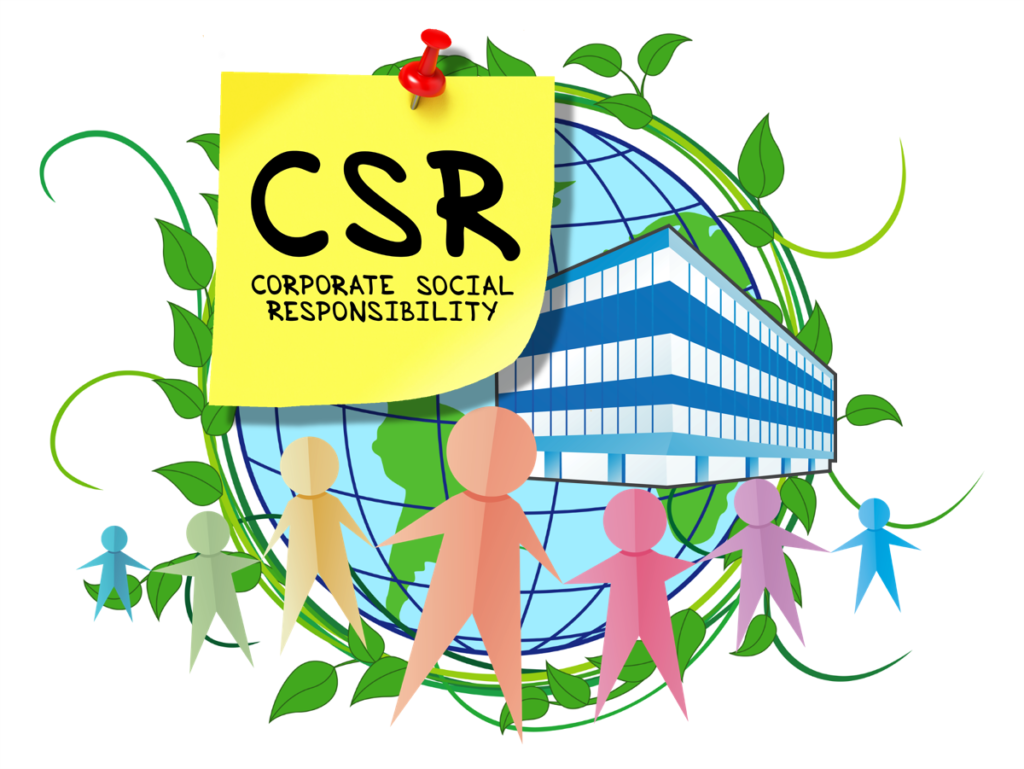Corporate social responsibility is an interesting topic. Skeptics dismiss the topic as a corporate public relations stunt and some investors see it as pit into which resources are poured without any noticeable return. There are reasons to be skeptical. In the past, corporations have been notoriously exploitative and the result has been the rich getting richer at the expense of the poor. Corporations have been slow learners. I believe, however, there are good reasons to be sanguine about the future. Although corporate social responsibility sounds like something ancillary to a business’ main focus, it’s not. A corporation’s first social responsibility is to stay in business. A company that goes out of business can do no good, can add no value, can employ no people, and can pay no taxes. Jack and Suzy Welch made this point years ago. They wrote, “In this enlightened day and age, whether times are good or bad, companies must be socially responsible. … A company’s foremost responsibility is to do well. That may sound politically incorrect, but the reason is inexorable. Winning companies create jobs, pay taxes, and strengthen the economy. Winning companies, in other words, enable social responsibility, not the other way around. And so, right now — as always — companies should be putting profitability first. It’s the necessity that makes every other necessity possible. … We’re only saying that corporate social responsibility — or CSR, as it has come to be known — needs to adapt to the circumstances. It hasn’t become a ‘luxury,’ … but leaders today do need to pin down, for themselves and their employees, CSR’s place among the company’s priorities.”[1] The question is: What good can socially responsible businesses do beyond simply staying in business?
Profiting by Doing Good
When discussing corporate social responsibility, most people focus on two areas: the environment and people. Faculty members at the University of Edinburgh define CSR this way: “CSR aims to ensure that companies conduct their business in a way that is ethical.”[2] They continue:
“This means taking account of their social, economic and environmental impact, and consideration of human rights. It can involve a range of activities such as:
- Working in partnership with local communities
- Socially responsible investment (SRI)
- Developing relationships with employees and customers
- Environmental protection and sustainability
Some businesses have as their main purpose the fulfilment of social or environmental goals, as opposed to a business that tries to achieve its financial goals while minimizing any negative impact on society or the environment. These businesses are called Social Enterprises.”
The International Institute for Sustainable Development (IISD) lists a few of the drivers “pushing business towards CSR.”[3] They include:
1. The shrinking role of government. “Shrinking government resources, coupled with a distrust of regulations, has led to the exploration of voluntary and non-regulatory initiatives instead.” The current political climate in the U.S. certainly places a greater burden on businesses to be socially responsible.
2. Demands for greater disclosure. “There is a growing demand for corporate disclosure from stakeholders, including customers, suppliers, employees, communities, investors, and activist organizations.”
3. Increased customer interest. “[A] survey by Environics International [found] more than one in five consumers reported having either rewarded or punished companies based on their perceived social performance.” This is just one area where social responsibility and corporate profitability interact.
4. Growing investor pressure. “A survey by Environics International revealed that more than a quarter of share-owning Americans took into account ethical considerations when buying and selling stocks.” Investors are well aware negative publicity about unethical practices can harm both a corporation’s reputation and its bottom line.
5. Competitive labor markets. “Employees are increasingly looking beyond paychecks and benefits, and seeking out employers whose philosophies and operating practices match their own principles. In order to hire and retain skilled employees, companies are being forced to improve working conditions.” Devin Thorpe (@devindthorpe), founder of the Your Mark on the World Center, indicates interviews he conducted with business executives found companies with strong CSR strategies have happier employees and they end up with better employees.[4] One sure way to negatively affect a corporation’s bottom line is to uncover slave labor in the supply chain.
6. Supplier relations. “As stakeholders are becoming increasingly interested in business affairs, many companies are taking steps to ensure that their partners conduct themselves in a socially responsible manner.” Corporations have learned guilt by association is alive and well in the business sector.
The IISD goes on to list some of the positive outcomes when businesses adopt strong social responsibility strategies. They include: Improved financial performance; lower operating costs; enhanced brand image and reputation; increased sales and customer loyalty; greater productivity and quality; more ability to attract and retain employees; reduced regulatory oversight; access to capital; workforce diversity; product safety; and decreased liability. Brian Hughes (@BrianHughes116), CEO and Founder of Integrity Marketing & Consulting, concludes, “As companies of all sizes are quickly learning, social responsibility is a contemporary business imperative.”[5]
Environmental Benefits
Because climate change and environmental damage affect the entire planet not just a factory or community, environmental benefits of CSR strategies are probably the most-often discussed benefits. Socially responsible companies try to reduce their carbon footprint, reduce waste, use resources wisely, and ensure their products are safe. Sustainability is one of the main topics of focus. Although recycling has been discussed for years, we’re still not doing very well. Kadir van Lohuizen (@mediakadir) reports, “The world generates at least 3.5 million tons of solid waste a day, 10 times the amount a century ago, according to World Bank researchers. If nothing is done, that figure will grow to 11 million tons by the end of the century, the researchers estimate.”[6] By reducing waste and using resources more efficiently, businesses help the planet and become more profitable. Some companies are moving towards a circular economy featuring zero waste as all resources used in products are recycled or reused. The last few years have demonstrated ignoring climate change can have serious supply chain repercussions. Extreme weather events can cause unanticipated disruptions and damage to infrastructure. Practices contributing to pollution and climate change also have a downstream price tag. China and India are now learning, as did the U.S., cleaning up polluted sites is neither easy nor cheap and long-term health repercussions are also costly in both human and monetary terms.
Social Benefits
Social benefits from strong CSR strategies are many and varied. As noted at the beginning of this article, the social benefits of a successful business begin with employing workers, strengthening the economy, and paying taxes. Beyond those basic benefits, corporations often make charitable contributions to organizations in the communities in which they operate. Some corporations support volunteer programs and even pay employees to volunteer with local charities. There is a caution here. Some well-intentioned efforts might actually cause more harm than good. For example, supporting give-away programs that undermine local economies. Ryan Scott (@ryan_scott), founder and CEO of Causecast, recommends doing your homework. He writes, “Not every company has a brand image that naturally aligns itself with a particular issue (think Patagonia and environmentalism), but you must make choices about your volunteer and giving efforts that don’t feel like greenwashing, pinkwashing or other cynical directions.”[7] He adds, “Charitable giving and volunteering is an essential part of business today. Gallup research has found that when choosing between products of equal value and price, 94 percent of shoppers will choose the brand connected to a social cause.”
Summary
Corporate social responsibility means doing the right thing for the right reasons. It’s not idealism. Done correctly CSR aligns with and supports corporate goals and strategies. CSR can boost a company’s reputation or destroy it. In today’s information age, ignorance of what is happening in the supply chain is no longer an excuse. More stakeholders are holding businesses accountable for their actions as well as for the actions of their suppliers. The sooner you understand CSR is not an ancillary business activity the better off you will be.
Footnotes
[1] Jack and Suzy Welch, “Giving in an Unforgiving Time,” Bloomberg Businessweek, 1 June 2009.
[2] Faculty, “What is corporate social responsibility?” University of Edinburgh, 3 July 2017.
[3] Staff, “Corporate social responsibility,” International Institute for Sustainable Development, 2013.
[4] Devin Thorpe, “Why CSR? The Benefits Of Corporate Social Responsibility Will Move You To Act,” Forbes, 18 May 2013.
[5] Brian Hughes, “Why Corporate Social Responsibility is Essential for Brand Strategy,” The Huffington Post, 22 February 2016.
[6] Kadir van Lohuizen, “Drowning in Garbage,” The Washington Post, 21 November 2017.
[7] Ryan Scott, “Choosing Social Causes That Make Sense For Your Company,” The Huffington Post, 16 January 2017.





